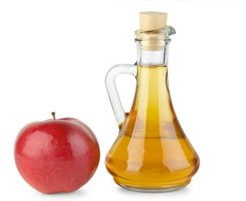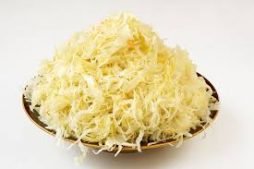Probiotics and Prebiotics do have different functions and may improve your health considerably by combining the two as they seem to go hand in hand, and as the saying goes... ''two hands are better than one''!
Let's take a look first at Probiotics....
Probiotics are definitely very much in the public health arena awareness right now and the different kind of fermented foods keep popping up in our health food stores, which is great for us as a consumer! This is the type of foods we want to consume. Keeping good gut health is essential for our digestive system. Fermented foods provides you with many strains of good bacteria, the most two common type you may hear about is lactobacillus or bifidobacterium. Probiotics are acid (and heat) sensitive, so it might be helpful to keep in mind that your own stomach acids can destroy some of the probiotics in your gut, so it makes sense to add more raw, organic (if possible) fermented foods.
Probiotics work in the gut, they maintain the balance of the 'good' and 'harmful' bacteria. They assist the gut with digestion and help food to move through your gut. We all naturally have Probiotics in our gut and adding other Probiotic foods (fermented) can assist with some common conditions such as:
- Antibiotic related diarrhoea
- Inflammatory bowel disease
- Assisting with some allergies in children
- The control of high blood pressure
- Immune function and infections
- Lactose intolerance
- Urinary Tract
- Vitamin production (deficiencies such as Vitamin K and Vitamin B12)
There are many ways to access these live probiotic cultures, such as tablets, powders, capsules and sachets, but as I am a fan of real food, I would suggest using (preferably organic) sauerkraut, dairy free yoghurts, water and coconut kefir, miso etc, as you know exactly what is in them, or have fun making your own

Now lets talk about Prebiotics....
Prebiotics haven't so much been in the front stage, but we need to be aware of what Prebiotics are and why you need them. You may already be taking Prebiotics and not know it. Prebiotics is the other 'hand' so to speak that goes with having Probiotics. Prebiotics foods are insoluble fiber, inulin, pectin, simple sugars fructooligosaccharides (FOS), that act as a fertiliser in the colon or large intestine and aid the bacteria already present. They also assist with the the survival of newly added bacteria strains.Prebiotics can be very helpful, in fact they really are essential to your good health and well-being. They nourish the Probiotics from what your gut produces and the fermented foods you may consume. If you don't consume foods rich in Prebiotics then the amount of Probiotics in your gut can decline.Research has shown that taking in increase of Prebiotics foods can help with:
- Assimilating calcium and other mineral absorption
- Inflammatory bowel disease (Chrohn's)
- Show to moderate cholesterol and triglyceride - Heart health
- Immune System by boosting white blood cells ( your fighter cells)
- Irritable Bowel Syndrome (IBS)
- Gut Health.. improved digestion
So, where you get your Prebiotic fibre rich foods from?
Vegetables mainly and some whole grains, pectin (from apples) and even honey.
Here are some Prebiotic food Sources.
- Raw, dry Chicory Root - Chicory may provide direct functional support to the digestive reactions in the body. Chicory root assists the flow of bile, which supports digestion. Bile helps break down fats, organic
chicory root contains inulin. It is supportive to the liver from it's antioxidant effect.
- Raw, dry Jerusalem Artichoke -The artichoke contains about 2% protein, no oil, and a surprising lack of starch. It is rich in the carbohydrate inulin
- Raw, dry Dandelion Greens - Loads and loads of minerals, vitamins and antioxidants. Add them to your salads. they grow wild too! go for a walk and you will no doubt find some in your garden or lawn, (or neighbours)
- Raw, dry Garlic - Most people like garlic and go in so many dishes and contain so many beneficial ingredients. Antiviral, antioxidant and anti-inflammatory.
- Raw, dry Leeks - Part of the garlic and onion family, leeks are a great source of vitamins and minerals, such as: vitamin A, vitamin B6, vitamin C, vitamin K, Iron, Calcium, Magnesium and Manganese. Leeks see in the elimination of noxious waste matter in the body and secretes digestive fluids, thereby improving digestive function.
- Raw, dry Onions - Contain a natural source of inulin, antioxidants,
- Raw Asparagus - Asparagus contains high levels of the amino acid asparagine, a natural diuretic, Like leafy greens, asparagus delivers folate, which works with vitamin B12. Asparagus is a particularly rich source of glutathione, a detoxifying compound that helps break down carcinogens and other harmful compounds like free radicals. another delicious food that may help protect against and fight certain forms of cancer, such as bone, breast, colon, larynx and lung cancers. Packed with vitamins, minerals and antioxidants.
- Raw Banana - Not quite ripe actually work best in this case as a prebiotic, as they are most starch resistant.
- Gum - Arabic or Acacia - Gum is a binder and is used in some medicines, supplements, etc. You can add it to your diet if you wish, but in my opinion, they are plenty of other options without using a binder in your diet.
- Apple Cider Vinegar - Raw, unfiltered apple cider vinegar is fermented apples, which contain pectin - an essential for good digestion. Apple Cider Vinegar can be confused with probiotics because the pectin in the apples promotes healthy digestion by encouraging the growth of good bacteria, whereas probiotics are the good bacteria. Pectin is a natural prebiotic carbohydrate that is responsible for slowing nutrient absorption by binding to products in your digestive tract that your body can't use. These are waste products such as cholesterol, harmful bacteria and even toxins and pathogens. After the pectin in the apple cider vinegar binds to the "waste product," it carries the waste from your body by way of elimination -- your regular bowel movements -- leaving the probiotics in your system to grow and continue to protect your gut. The result is a symbiotic relationship that is a powerhouse for your body's digestive system.


What is the daily recommended dosage of Prebiotic foods?
It ranges from 4 -8 grams per day approx.So, as you can see, the plant food kingdom that natures provides us, aids us in so many ways. It heals, nourishes, and gives us energy. Eat your Greens, fermented foods. Also whole nuts and seeds, plenty of clean water, we are 80% water and we need to keep well hydrated. Plenty of exercise to assist in the elimination of waste. Our body needs movement to do that.So... Keep putting your banana's on your yoghurt ! Your greens! Your morning shot of Apple Cider Vinegar!
Love Your Gut!
references:
www.wikipedia.org/wiki/Probiotichttps:www.wikipedia.org/wiki/Prebiotic_(nutrition)www.prebiotin.comwww.livestrong.com

